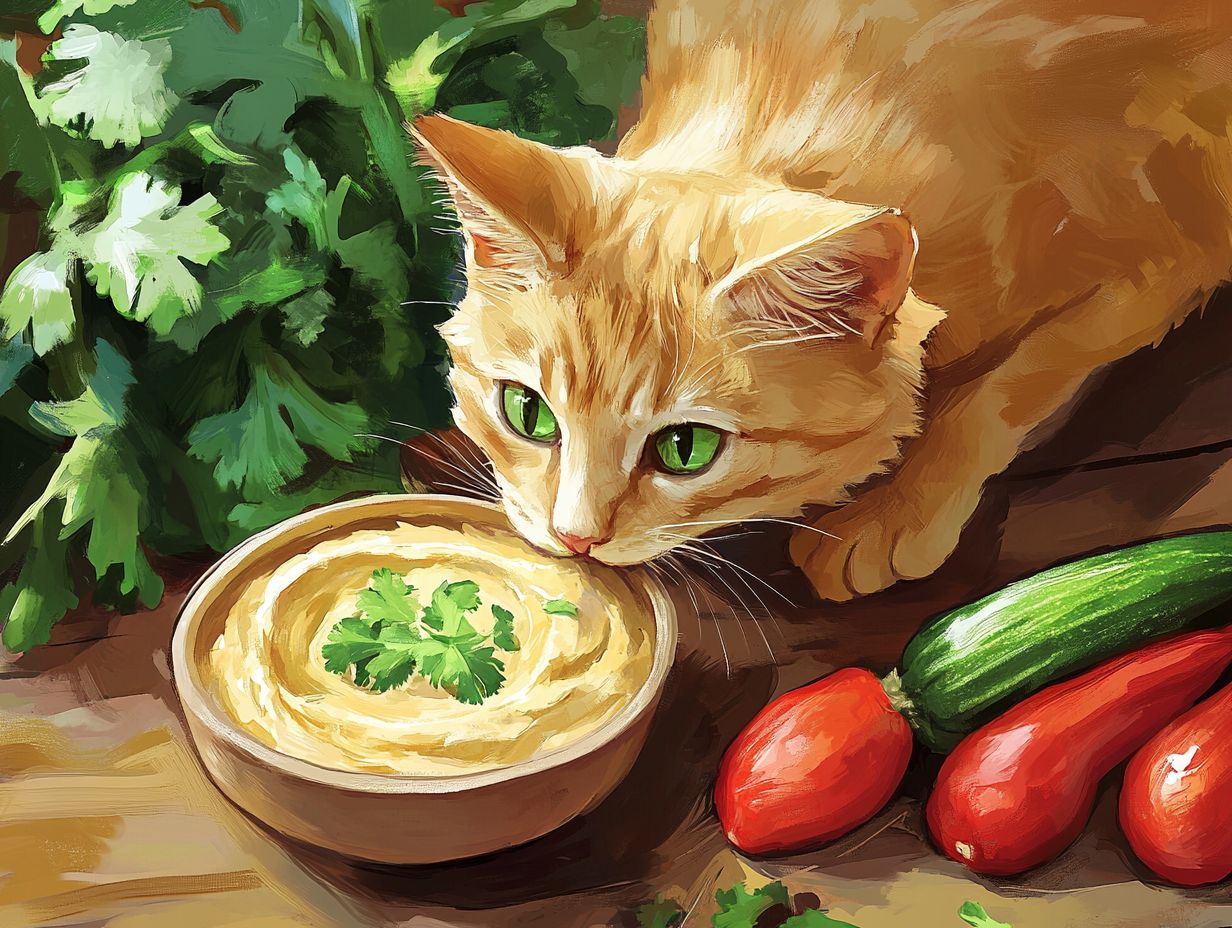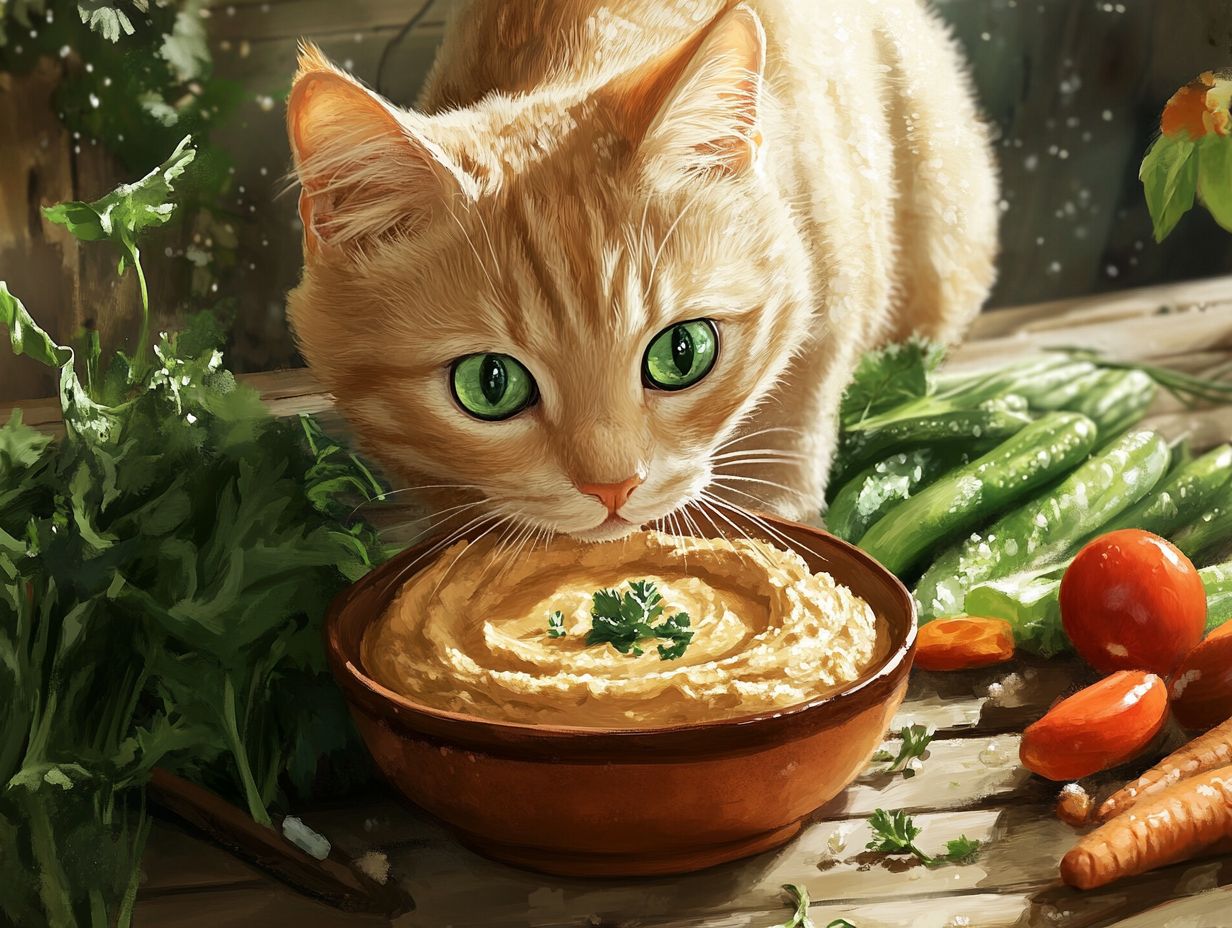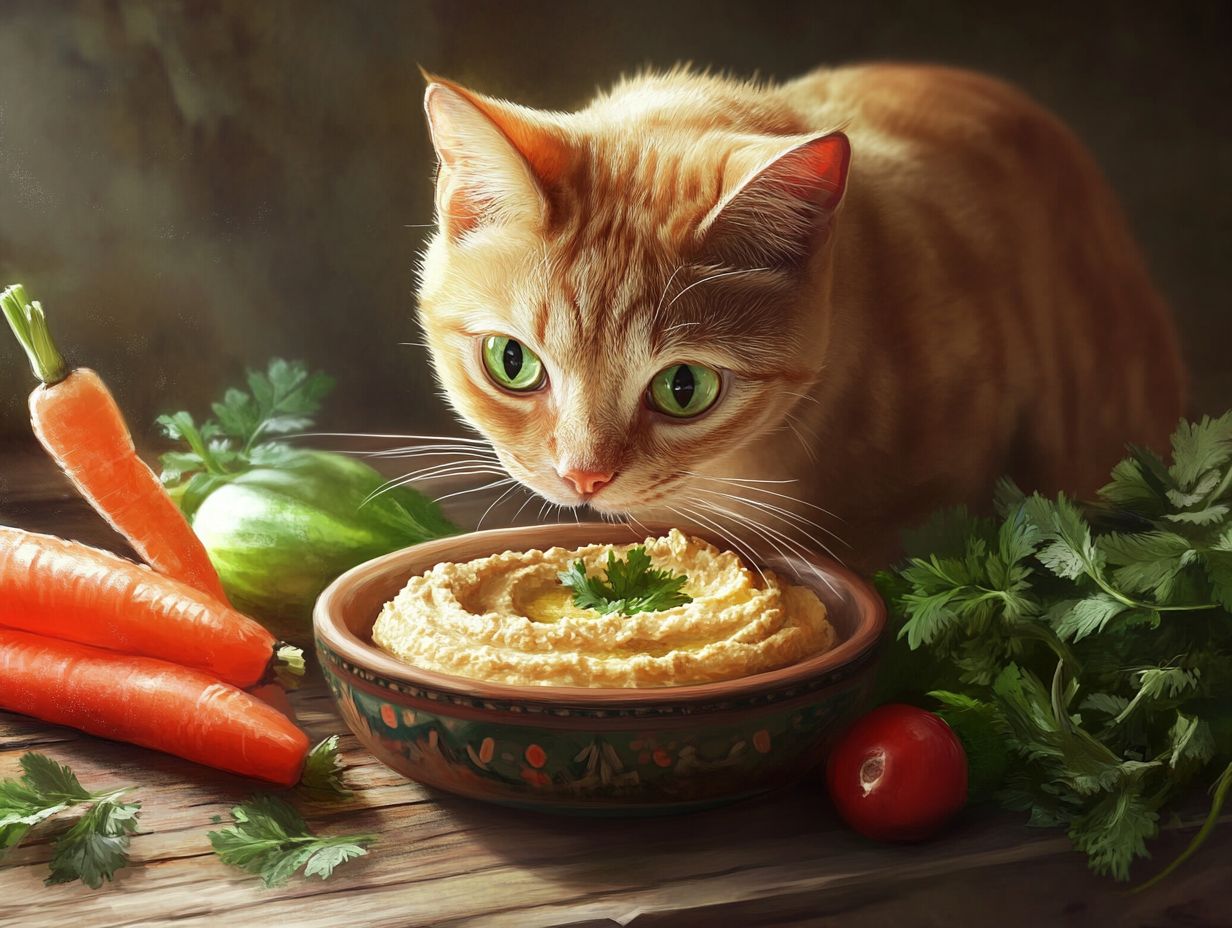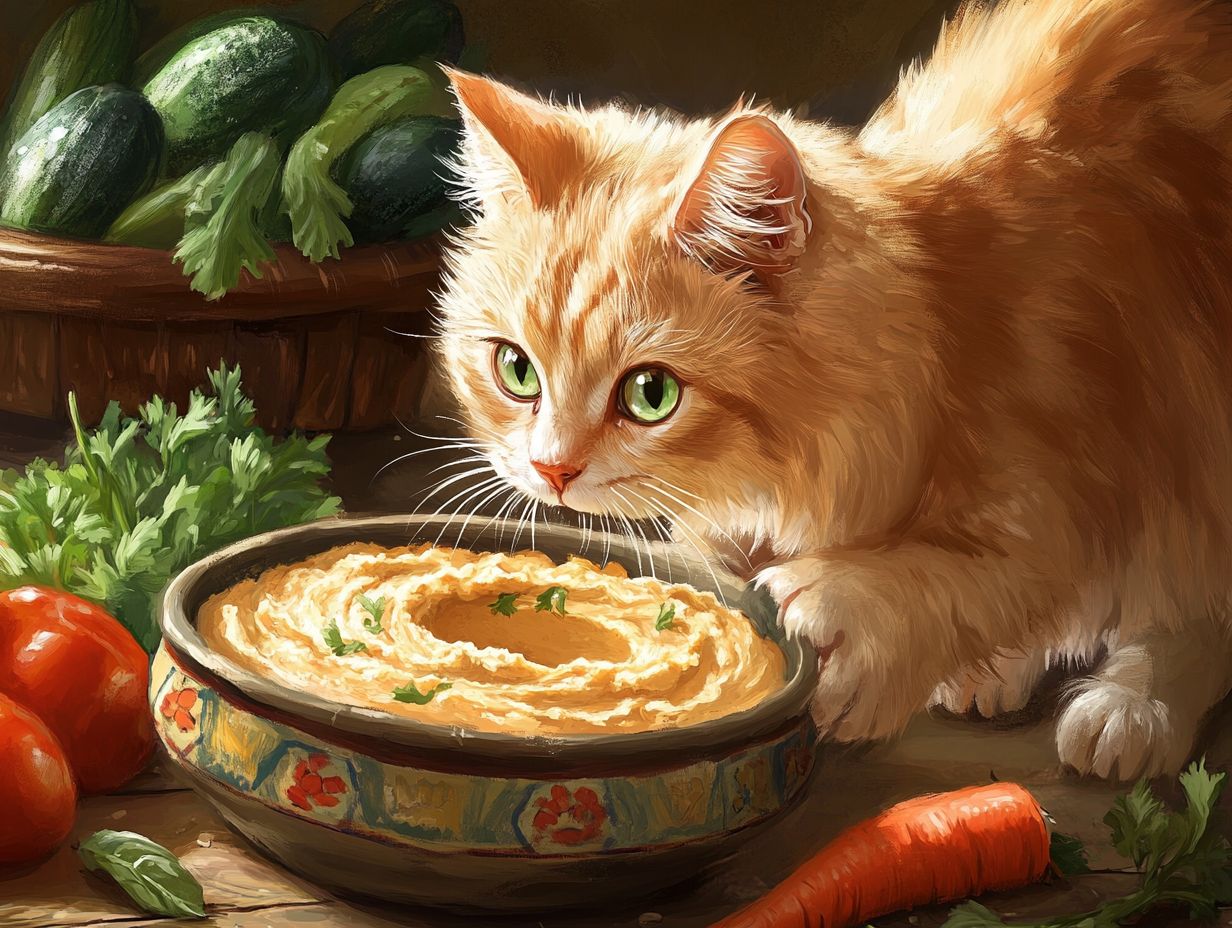While hummus is a popular and nutritious dish for humans, it is not safe for cats due to certain harmful ingredients. This article explores the ingredients and nutritional value of hummus, expert opinions on its safety for cats, and the potential risks involved.
It also discusses safe alternatives, like plain cooked chicken or turkey, to offer your cat and highlights any possible health benefits. You’ll find tips on how to introduce safe foods for cats into your cat’s diet.
Let’s uncover the truth about this popular dish and your furry companion!
Key Takeaways:

- Hummus is generally unsafe for cats, as it can cause digestive issues and potentially be toxic.
- Cats should stick to their regular diet and not be fed hummus as a treat due to potential risks and lack of essential nutrients.
- Consider offering your cats safe and nutritious alternatives such as cooked lean meats like chicken or turkey (about 1-2 ounces), vegetables, and commercially-made cat treats.
Understanding Hummus
Hummus is a Middle Eastern dip made from cooked chickpeas blended with a variety of ingredients, including tahini (a paste made from ground sesame seeds), lemon juice, garlic, and olive oil. This versatile spread offers multiple health benefits, serving as a source of protein and other essential nutrients. For vegetarians, it’s an excellent addition to a vegetarian diet.
Understanding the various ingredients and nutritional aspects of hummus is important for evaluating its advantages and disadvantages, particularly when considering its inclusion in a healthy diet.
Can Cats Eat Hummus?
Hummus may be healthy food for humans, but the question of whether cats can eat hummus is more complicated. While some ingredients, such as chickpeas, are not toxic to cats, garlic can be dangerous and may lead to health issues such as anemia or gastrointestinal upset. Cats require a diet primarily composed of meat, and their nutritional needs differ significantly from those of humans. Therefore, before adding hummus or any human food to a cat’s diet, it is essential to consult a veterinarian.
Expert Opinions and Risks
Expert opinions on cats consuming hummus underscore the inherent dangers, particularly due to the toxicity of garlic. While hummus may not be highly toxic, it poses risks including potential poisoning and digestive problems. The consensus is that cats should primarily consume a meat-based diet, making human foods like hummus inappropriate as regular treats or substitutes. It’s essential to consult with a veterinarian for proper care and avoid excessive experimentation with human food.
Garlic poses a specific danger because it contains thiosulfate, which is known to cause anemia in cats. Even small amounts can result in significant health concerns, leading to symptoms such as lethargy, vomiting, and increased heart rate.
Additionally, ingredients like tahini can cause gastrointestinal upset, further straining a cat’s already sensitive system. Given the numerous potential risks, experts recommend adhering to a species-appropriate, high-protein diet rather than experimenting with human foods that offer little nutritional value for their pets.
Safe Alternatives for Cats

Instead of hummus, consider offering your cat small pieces of plain cooked chicken or turkey (about 1-2 ounces) as occasional treats. You can also introduce safe vegetables like cooked carrots or commercially-made cat treats designed for feline health.
Conclusion
Overall, it is best to avoid feeding hummus to your cat due to potential health risks. Stick to a balanced diet designed for feline health.
Can Cats Eat Hummus? A Comprehensive Guide
This article explores whether cats can safely eat hummus, examining the potential benefits and risks involved. While hummus contains nutrients, it is crucial to understand how to introduce it to your feline friend safely.
Benefits of Hummus for Cats
Though hummus is primarily meant for human consumption, it is made from chickpeas, which can offer some nutritional benefits when given in minimal, controlled amounts. These benefits may include:
- Improved digestion
- Increased energy
- Better calorie intake
- Enhanced hydration
- Improved anal gland function
- Vitamin supplementation
- Overall health enhancement
However, it is essential to verify these nutritional claims against reputable veterinary sources.
Risks of Feeding Hummus
While hummus can offer some benefits, there are risks to consider. Owners must avoid feeding hummus that contains toxic ingredients such as:
- Onions – Can cause anemia in cats.
- Garlic – Toxic and can lead to various health issues.
- Chocolate – Highly toxic and can be fatal.
Always check the ingredient list, and consult with a veterinarian before introducing new foods.
Guidelines for Safe Feeding
When considering hummus for your cat, be cautious and follow these guidelines:
- Start with a small portion to monitor your cat’s reaction.
- Only feed hummus that is plain and free from harmful additives.
- Prefer alternatives like plain cooked chicken, turkey, or pureed pumpkin.
- Prepare treats by cooking the meat without sauces or spices.
For instance, a small piece of chicken can be a healthy treat, while pumpkin mixed with a bit of yogurt offers fiber and vitamins.
Conclusion
In summary, while hummus can provide certain nutrients for cats in small amounts, it is crucial to prioritize their safety. Always consult with a veterinarian before introducing new foods, and remember that cats are meat eaters. Focus on safe, nutritious treats to ensure your cat remains healthy and happy.
For more information on safe foods for cats, check out this article on whether cats can eat hummus.

Hummus is a popular human food, but is it safe for cats? This article explores the potential risks and guidelines for introducing hummus into your cat’s diet. Before introducing hummus to your cat, consult a veterinarian to ensure that the hummus contains no potentially harmful additives and will not disrupt your cat’s dietary needs. When you begin to introduce hummus, start with a small amount to observe for any negative reactions, such as diarrhea or dehydration. If no adverse health issues arise, you can gradually increase the portion over time.
Tips for Feeding Hummus to Cats
When introducing hummus, prioritize safety by selecting plain, unseasoned varieties. Avoid any hummus that contains garlic, onion, or spices, as these can be harmful to cats. A good approach is to mix a small amount of hummus into your cat’s regular food to encourage acceptance while keeping the quantity low to minimize the risk of diarrhea. Monitoring your cat’s reaction will help you gauge their tolerance and determine if hummus can be safely included in their diet.
Guidelines for Feeding Hummus
- Start with a small amount: No more than half a teaspoon.
- Monitor for adverse reactions such as diarrhea or vomiting.
- Consult with a veterinarian if unsure about portion sizes.
Additionally, preparing hummus in a way that meets your cat’s dietary needs is crucial. You might consider thinning the hummus with water or low-sodium broth to make it easier for them to lap up. For more information, check out this article on whether cats can safely eat hummus. It’s vital to avoid excessive amounts and to ensure the hummus is free from spices that could cause diarrhea or dehydration.
If they show interest, start with just half a teaspoon and only increase the amount if they respond enthusiastically. It’s also wise to keep an eye out for any behavioral changes, such as over-grooming or unusual litter box habits, as these could indicate intolerance symptoms. Consider investing in cat insurance to cover unexpected vet visits due to dietary issues.
Frequently Asked Questions
Can cats eat hummus on International Hummus Day?
No, hummus is not safe for cats due to ingredients that can be harmful. Cats have different nutritional needs, and their digestive systems cannot process certain ingredients found in hummus. For expert advice, consider consulting a veterinarian from PangoVet.
What ingredients in hummus make it unsafe for cats, even on International Hummus Day?

Some ingredients found in hummus, such as garlic, onion, and lemon juice, can be harmful to cats. These ingredients can cause digestive issues and even lead to anemia in cats.
Is it safe for cats to have a small amount of hummus, even as a special treat on International Hummus Day?
No, even a small amount of hummus can potentially be harmful to cats. It is best to avoid giving any amount of hummus to your feline friend.
Can giving my cat hummus as a treat be harmful?
Yes, using hummus as a treat for your cat can be harmful. It is important to stick to treats specifically made for cats to ensure their safety and well-being.
What should I do if my cat accidentally eats hummus?
If your cat accidentally consumes hummus, monitor their behavior and watch for any signs of illness. If you notice any concerning symptoms, it is best to consult with your veterinarian.
Are there any alternatives to hummus that are safe for cats?
Yes, there are a variety of cat-safe treats available that you can give your feline friend instead of hummus. Some options include cooked chicken, fish, and specific treats made for cats.
Warnings
Ingredients like garlic and onion can cause severe health issues, including anemia. Always prioritize cat-safe treats to ensure their health and well-being.
In summary, it is best to avoid feeding hummus to your cat altogether. Always prioritize cat-safe treats to ensure their health and well-being.